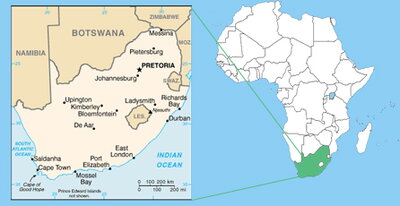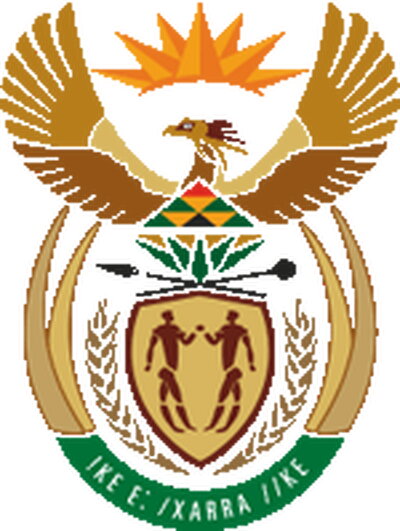

Region: Southern Africa
Quick Facts:
- Population: 45.3 million
- Capital: Pretoria
- Area: 470, 693 sq miles (Slightly less than twice the size of Texas)
- Major Languages: English, Afrikaans, Sesotho, Setswana, Xhosa, and Zulu
- Life Expectancy: 47 years (men), 51 years (women)
- Literacy: 86.4%
- Monetary unit: 1 Rand (ZAR)=100 cents
- Exchange Rate: US $1= 9.625 (January 10, 2009)
- Income (GDP) per capita: $12,347 (constant 2000 international $, WDI 2005)
- Urban population: 59% of total population
- Paved roads: 20% of total road surface
- Electric Power Consumption (per capita): 4,504 kWH
- Fixed line and mobile phone subscribers: 473 per 1,000 people
- Internet Users: 78 per 1,000 people
- Internet Domain: .za
- Country Code: +27
- Time Difference: UTC +2 (8 hours ahead of Illinois during Standard Time)
- Climate: Temperate. Hottest month are January and February (57-78F ), coldest month is July (39-62F)
- Type of Government: Republic
- President: Thabo Mbeki
Historical Background:
The written history of South Africa begins with accounts of European navigators passing through on the East Indies trade routes. The Dutch East India Company set up a provisionary station in the Cape of Good Hope in 1652. For most of the next two centuries, the slowly-expanding settlement was a Dutch possession. Descendants of Dutch settlers, Boers, developed the Afrikaans language in spreading through the Cape region. Britain seized the Cape of Good Hope in 1797, and seized control of the Cape Colony when the Dutch East India Company declared bankruptcy. Shortly thereafter, Afrikaaners (Boers) trekked north and founded white supremacist Boer republics of Transvaal and the Orange Free State.
After the discovery of gold and diamonds in the Boer Republics, Great Britain launched the Boer war, which ultimately unified the region into the Union of South Africa in 1910. This newly created union was a dominion of the United Kingdom and evolved into a racially segregated Apartheid state. In 1961, the Union of South of Africa was reformed into the fully independent Republic of South Africa, but maintained a system with no franchise for blacks. After decades of struggle, the Republic of South Africa became a non-racial democracy in 1994.
Socio-political Background:
South African politics is conducted in the framework of a federal parliamentary representative democratic republic, wherein the President of South Africa, elected by parliament, is both head of state and head of government, and of a pluriform multiparty system. Executive power is exercised by the government. Legislative power is vested in the government and the two chamber of Parliament.
After a life of resistance to Apartheid and thirty years in prison, Nelson Mandela became the first president of the non-racial democracy of South Africa in 1994. In 1999, Thabo Mbeki was elected to Presidency.
Economy:
Large income gaps lead to South Africa having a dual economy, where one layer rivals other developed countries, while the second has only the most basic infrastructure. In this respect, as well as in high-levels of productivity, a division of labor between formal and informal sectors, and an uneven distribution of wealth and income, South Africa resembles a developing country.
The manufacturing, services, mining and agricultural sectors are well developed. By UN classification, South Africa is a middle-income country with an abundant supply of resources, well developed financial, legal, communications, energy, and transport sectors.
Since 1994, the government of South Africa has promoted market friendly policies to generate growth and reduce poverty. This has included respect for property rights of white South Africans and affirmative actions to promote blacks economically. At the start of 2000, President Thabo Mbeki vowed to promote economic growth and foreign investment by relaxing restrictive labor laws, stepping up the pace of privatization, and cutting unnecessary government spending.
South Africa has a rich mineral resource base and is the world’s largest producer and exporter of gold and platinum. Diamonds and coal are other major mineral exports. Agricultural exports have constituted around eight percent of South Africa’s total export earnings for the past five years. About ten percent of formal employment is generated by this sector. South Africa is the eighth largest wine producer in the world, and the eleventh larger producer of sunflower seeds.
Exports comprise about thirty percent of total national income. South Africa is a member of the World Trade Organization and has seen great success in reducing high tariffs and subsidies. It also enjoys most-favored-nation tariff rates for trade with the US. The Overseas Private investment Corporation assists US investors in the South African market with services such as political risk insurance, loans, and loan guarantees.
Trade Information:
- Exports: $59.15 billion (2006 est.)
- Export Goods: Gold, diamonds, platinum, other metals, and machinery
- Main Export Partners (2005): Japan (9.9%), UK (9.7%), US (9.5%)
- Imports: $61.53 billion (2006 est.)
- Import Goods: Machinery and equipment, chemicals, petroleum products, scientific instruments, and foodstuffs
- Main Import Partners (2005): Germany (14.2%), China (9.1%), US (7.9%)
Resources for Businesses:
Embassy of the Republic of South Africa, Washington DC
3051 Massachusetts Ave, NW
Washington DC 20008, USA
Tel: (202) 232 4400
Fax: (202) 265 1607
E-Mail: info@saembassy.org

South African Consulate General in Chicago
200 South Michigan Avenue
6th floor
Chicago, IL 60604
Tel: (323) 651 0902
Fax: (323) 651 5969
E-mail: sacgconsular@sacg.xohost.com
South African Chamber of Commerce and Industry (SACCI)
PO Box 213
Saxonwold 2132
South Africa
Tel: (27) 11 446 3800
Fax: (27) 11 446 3847/9
E-Mail: info@sacob.co.za
Overseas Private Investment Corporation (OPIC)
South Africa's futures exchange (agriculture commodities) Africa’s only agricultural derivatives market offering effective price discovery and efficient price risk management for grains in South and Southern Africa
South Africa's futures exchange (equities division)
Last updated on 09/23/2009